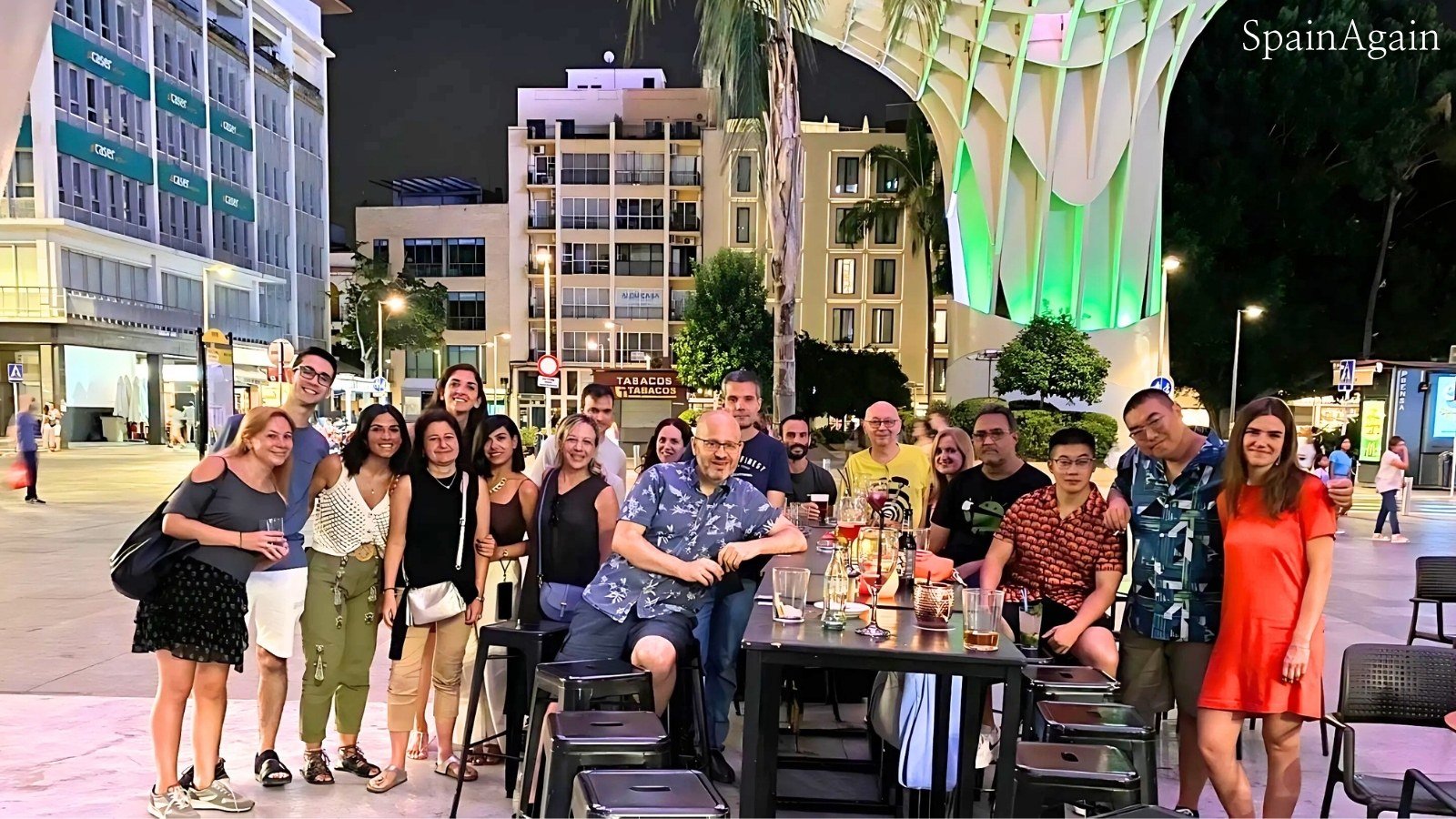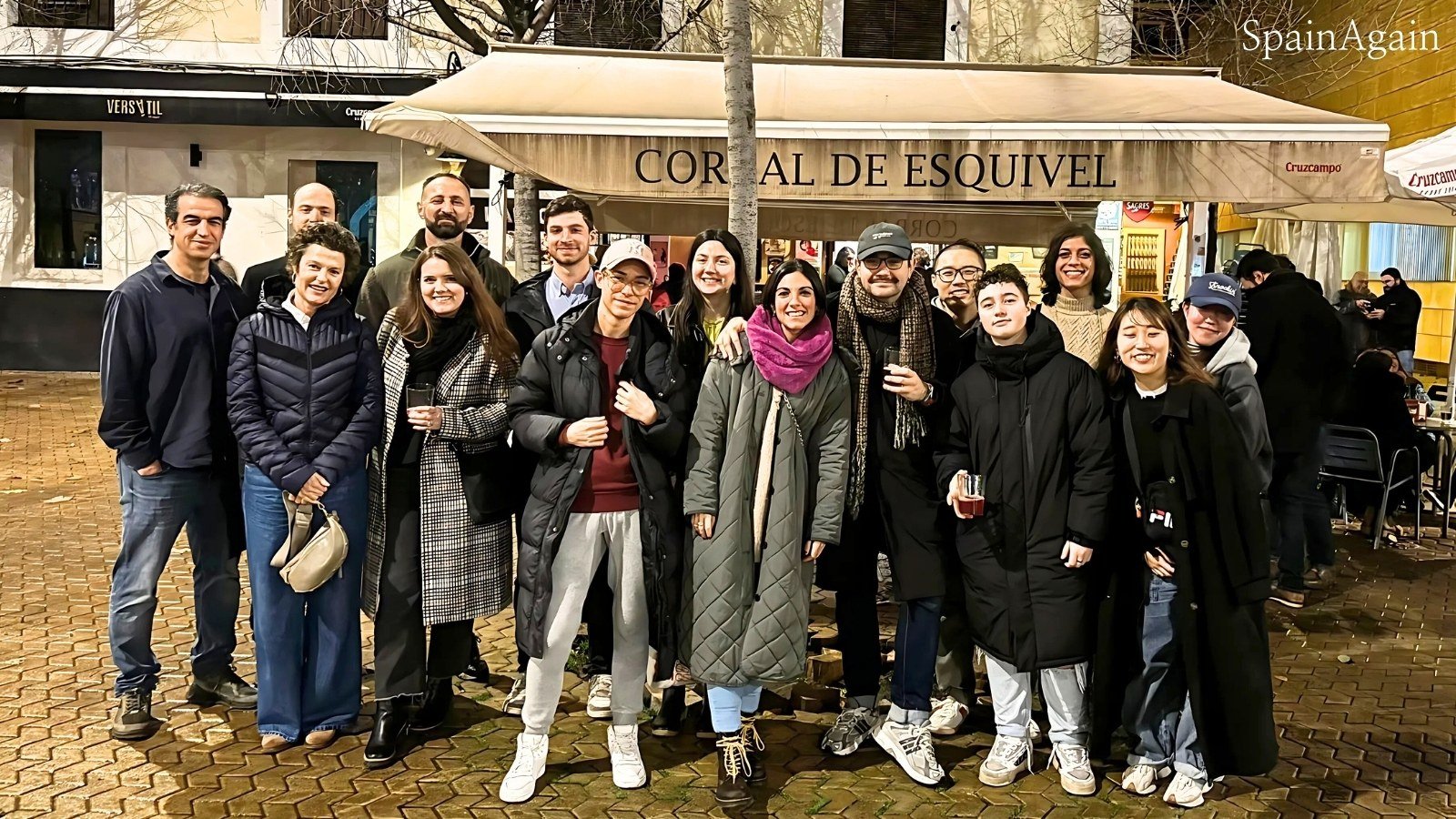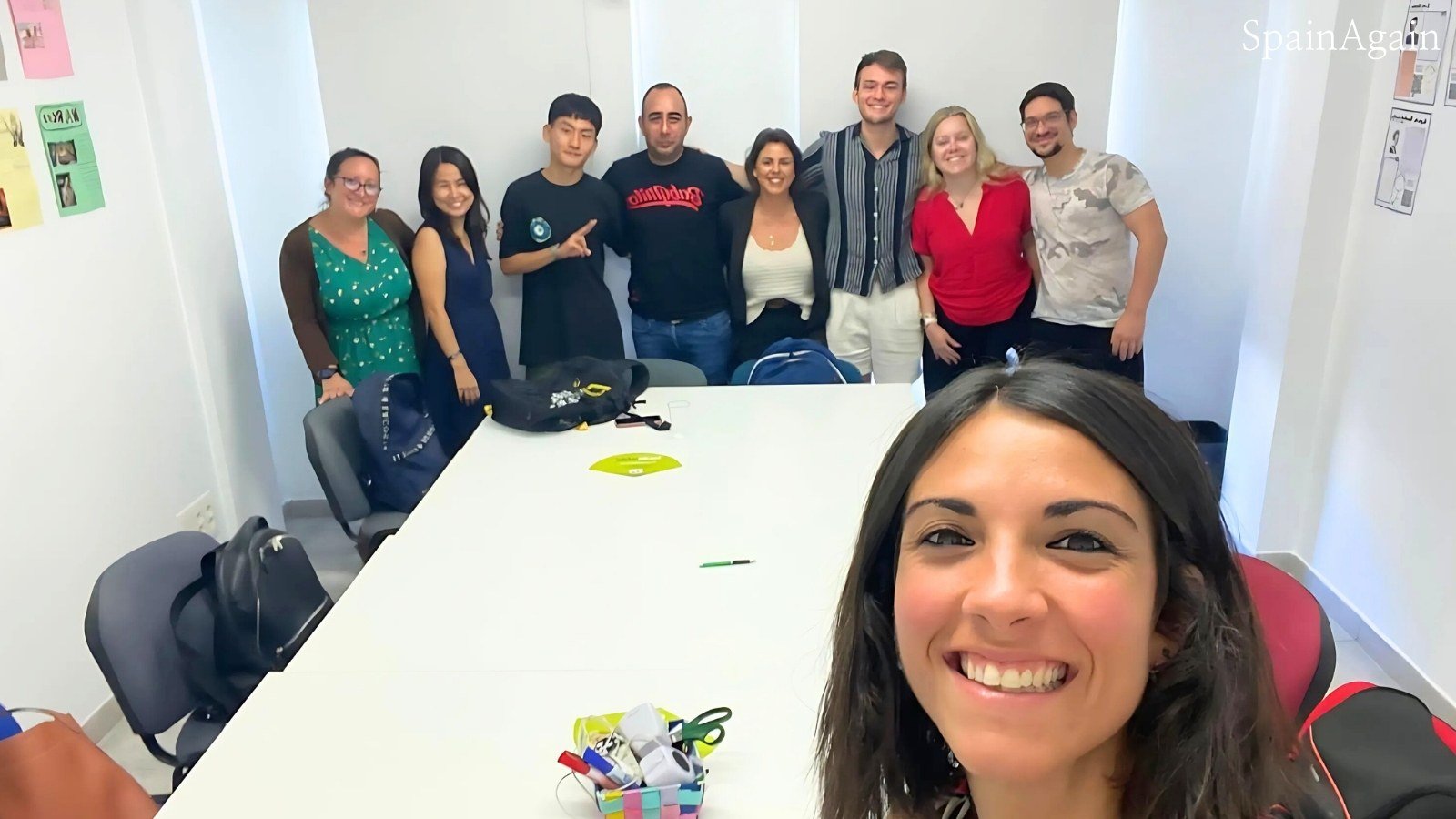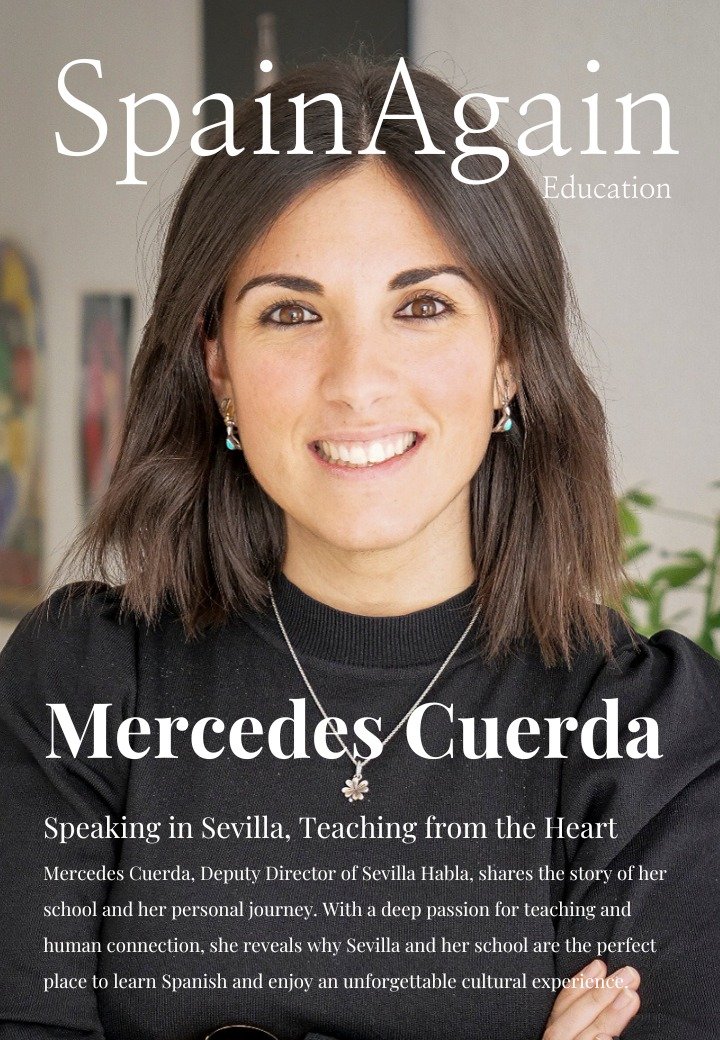Could you briefly introduce yourself?
My name is Mercedes Cuerda, Deputy Director of Sevilla Habla. A pleasure to meet you!
I’m originally from Seville and have spent most of my 34 years here, although I’ve also lived in Italy and Tenerife.
I’m very proud of my roots and of how Seville has evolved—its life, culture, and everything the city has to offer.
What did you do before entering the education sector?
I’ve always worked in education, holding various roles such as sociocultural animator, teacher of Spanish as a Foreign Language, and secondary school teacher in a public institute.
What inspired you to pursue language education?
My passion and talent for languages, along with a strong vocation to teach, communicate, and promote cultural exchange. My open personality and natural interest in meeting people from diverse backgrounds also helped. I knew during my university years that I wanted to do this, and fortunately, I started working and living off of it at a young age—22 years old.
What was the key moment that led you to your current leadership position?
I had already been working at this school for several years—first as a teacher, then in administration, student services, HR, and public relations. Several months ago, I was offered the position of Deputy Director.
What do you enjoy most about your current role?
Interacting with students—helping them organize their stay and ensuring they have the best possible experience in both Seville and at our school. I also love meeting people from all over the world and learning about their countries and cultures.
What’s your favorite city or destination in Spain, and why?
As I mentioned, I love life in Seville and what the city offers, which is why I chose to stay. But I also fell in love with Tenerife—the island’s beauty, contrasts, lifestyle, climate, and landscapes captivated me.

What values do you consider essential as an educator?
Empathy, understanding, patience, motivation, social and professional responsibility, and dynamism.
What do you want students to gain through learning Spanish?
Besides the language and the ability to communicate, I want to share our culture and our unique way of viewing life and the world.
Aside from teaching, what aspects of the student relationship do you prioritize?
Supporting students both academically and personally, helping them with organization, visas, or emotional needs. I deeply value the close, family-like relationship we build with students and among staff. This is one of the things I’ve always loved about our school.
Tell us briefly about Sevilla Habla
Sevilla Habla is a Spanish language school for international students. It was founded in 2012 in Seville and has since been fully dedicated to helping students learn the language in a practical and enjoyable way.
We’re located in the heart of Seville’s historic center, in a lively square surrounded by shops, bars, and entertainment. Major landmarks, the metro, and universities are all nearby.
The neighborhood is rich in history, art, and culture, with iconic Sevillian squares like El Salvador, La Alfalfa, and San Francisco close by. It’s a place where locals and visitors from around the world mingle—a perfect environment to live and breathe the language and city.
What was the initial vision, and how has it evolved?
We began as a small school with two or three classrooms and gradually expanded. Today, we have 13 classrooms, a student lounge, and more. But we’ve always stayed true to our philosophy of offering a highly personalized and familiar experience, small group sizes, a strong communicative approach, and a commitment to quality standards.
Which are your most successful or representative programs?
Our 20-hour-per-week intensive courses with a maximum of 9 students per class. We offer more than 18 active level groups each week, from A1 to C1–C2.
What sets your school apart from other language academies?
The balance between high-quality education and an excellent atmosphere, along with strong relationships among students and staff. One of the things I love most is that our entire team—over ten teachers and all admin staff—knows nearly every student personally, even though we host over 100 students each week.
What teaching methodology do you use?
We apply a fully communicative approach, where classroom participation and conversation are central. We also follow the Instituto Cervantes’ guidelines and curriculum.
What kind of teachers work at the school?
All our teachers are qualified educators and specialists in Spanish language instruction. We have a stable team—everyone is a permanent staff member—and most have been with us for at least one or two years. This continuity helps maintain the quality and consistency of our classes.
What is the breakdown of student nationalities?
We welcome students from all over the world. Approximately 30% are European (Germany, France, Netherlands, Belgium, Italy, Poland), 20% from the UK, Canada, or the USA, 30% Asian (mainly Korea, Japan, and China), 10% Brazilian, and 10% from Africa (mainly North Africa and Morocco).
Which program would you especially recommend for students?
Our intensive courses, ideally for a period of 3 to 4 months if possible. We encourage students to participate in as many cultural activities as they can for full immersion. Of course, we also welcome short-term students.
Do you offer accommodation, cultural activities, or excursions?
Yes! We offer shared apartments with other students, homestays with locals, or with Spanish families (including half or full board options).
We organize at least three cultural activities weekly—tapas routes, guided visits, language exchanges in bars, photo contests, and more.
For trips outside Seville, we offer excursions based on group interest or demand, like last December when an A2 group and their teacher took a weekend trip to Granada.

Can you tell us about a student who left a lasting impression?
There are many. Some became close friends over time, others touched me deeply with their stories or shared experiences.
What special moments have you had with students?
I’ve had wonderful moments with many students and colleagues—from bringing them to my “caseta” at the Seville Fair, to beach outings, trips, and even accompanying some (as friends) to hospitals or important paperwork appointments. For some students, we become the closest thing they have to family here.
What has been your greatest challenge as Deputy Director?
Managing and resolving conflicts among students—whether in class or shared housing—and helping with bureaucratic or visa issues. Occasionally, we’ve also had to address complaints (sometimes justified, sometimes not) about teachers, courses, or housing.
How did you overcome these challenges, and what did you learn?
Each case is different. But conflict resolution has taught us to be more diplomatic and patient, to truly listen before acting, and to be both fair and assertive.
I’ve also learned a lot about legal and bureaucratic matters, especially regarding visas and immigration procedures.
How did the pandemic impact your school, and how did you adapt?
It was definitely a challenge. We had to manage uncertainty and make last-minute decisions frequently.
But we learned a lot and came out stronger. Our biggest growth came post-pandemic—we became an Instituto Cervantes Accredited Center, joined FEDELE (the official Spanish schools federation), and expanded our facilities and team.
What are your institution’s future goals or projects?
Our main goal is to maintain our quality standards and educational philosophy, while continuing to grow and adapting to legal and political changes, especially around immigration and visas.
How important is your relationship with students?
Very important. Students are incredibly positive and easy to work with. From enrollment to arrival and throughout their stay, it’s been a pleasure. They’re usually very satisfied with our courses and services.
We’d love to welcome even more students, and we encourage them to reach out with questions, concerns, or suggestions—so we can continue improving our services to meet their needs.
What do you hope to achieve through collaboration with SpainAgain?
First, we’d love to welcome more students.
Second, we hope to receive useful feedback and information about the expectations of students so we can better tailor our programs and services.
Why should a student choose your school?
Because of our high-quality teaching, our experience working with students, our dynamic and friendly atmosphere, and the variety of cultural activities we offer.

What advice would you give to those who want to study Spanish in Spain?
Come with enthusiasm and a desire to live new experiences. Trust the learning process and don’t stress too much about cultural or language differences. Rely on your classmates, housemates, and especially our team—we’re here to help.
What should students keep in mind to enjoy their stay to the fullest?
It’s best to come well-prepared (course, accommodation, administrative matters, local info), but with an open and flexible mindset. Adapting to a new country and culture can be challenging, but it’s also incredibly enriching and rewarding.
Any final message for our readers?
Just thank you so much for your attention!
We would be thrilled to welcome you to our school. Hopefully, we’ll meet you in person very soon!

